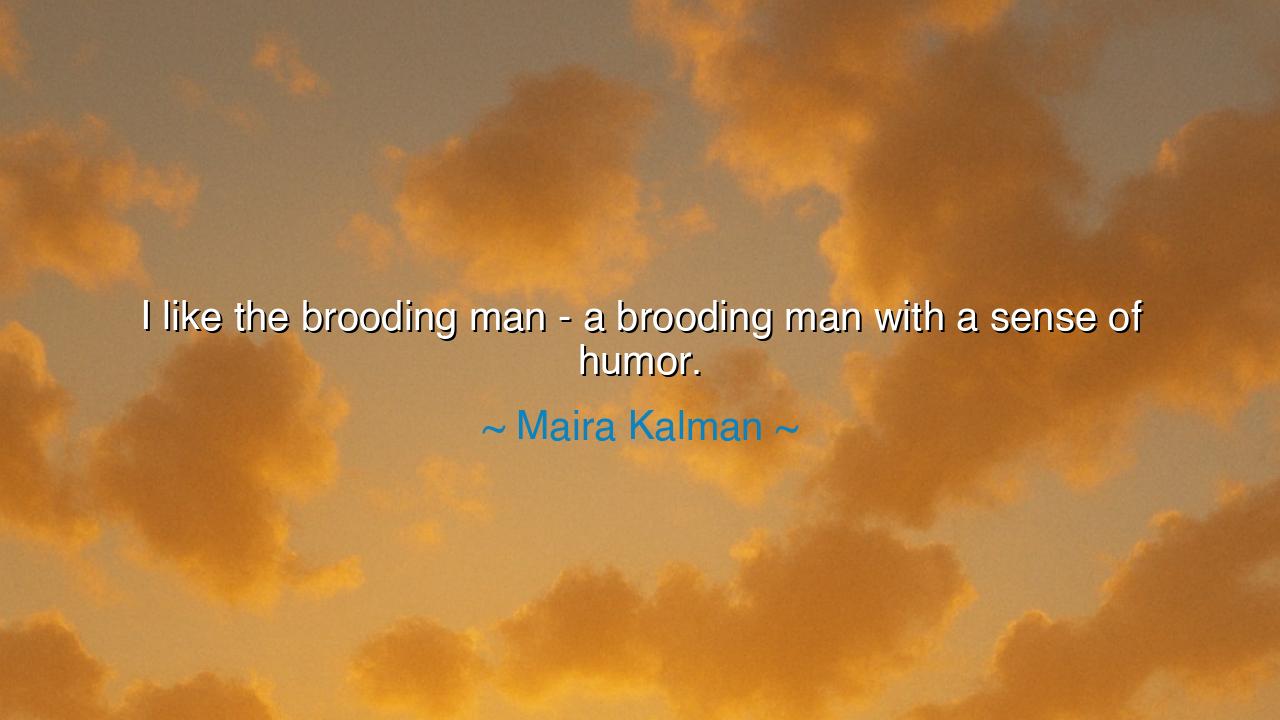
I like the brooding man - a brooding man with a sense of humor.






The words of Maira Kalman shimmer with paradox and beauty: “I like the brooding man — a brooding man with a sense of humor.” In this simple declaration lies a deep reflection on the human spirit, and on the nature of attraction not merely between people, but between opposing forces within the soul itself. For the brooding man, wrapped in introspection and gravity, represents the mind’s search for meaning; while the sense of humor symbolizes the heart’s acceptance of life’s imperfection. Kalman, in her quiet wisdom, reminds us that greatness lies not in purity of mood, but in balance — that one may carry both storm and sunlight within, and that it is precisely this union that makes a person whole.
The brooding man is not simply one who frowns or withdraws; he is one who feels deeply. His silence is not emptiness but contemplation. He stands, like a philosopher of old, gazing at the mysteries of existence — troubled not by trivial things, but by the vastness of the human condition. He asks the ancient questions: Why do we suffer? What is beauty? What is love? Such a man carries a certain gravity, a soulful depth that draws others toward him like a flame draws the moth. Yet if left alone in his solemnity, that same flame can consume him. It is only the presence of humor, as Kalman sees, that keeps the brooding spirit from turning into despair.
The sense of humor — that divine spark of levity — is not the opposite of depth but its companion. For what is humor, if not the mind’s way of finding light within shadow? The greatest humorists in history — from Mark Twain to Oscar Wilde — were themselves brooding men, haunted by the absurdities of life even as they laughed at them. Their wit was not born of indifference, but of understanding. They laughed because they saw the sorrow beneath the surface of things, and chose to dance with it rather than bow before it. To have a sense of humor, therefore, is to possess both clarity and compassion — to acknowledge life’s madness and still greet it with a smile.
History gives us many examples of this sacred duality. Consider Abraham Lincoln, a man burdened by the weight of a nation’s suffering, yet known for his warmth and humor. His jokes and stories were not mere entertainment; they were acts of survival, both for himself and for those around him. When the fires of war raged and the future looked grim, his humor became a shield — a way to remind the weary that even in tragedy, the human spirit could endure. In him lived the archetype of Kalman’s brooding man with a sense of humor — one who saw the darkness of the world but refused to be swallowed by it.
Kalman’s reflection is not only about men, but about humanity’s eternal longing for balance. Every soul, whether man or woman, carries within it the twin forces of contemplation and laughter, melancholy and joy. To favor one over the other is to lose harmony. The brooding side gives depth to our love, purpose to our labor, and meaning to our pain. The humorous side gives us resilience, grace, and the courage to continue. Together they form the alchemy of wisdom — the ability to look upon life’s contradictions and embrace them both.
The origin of her insight lies in the understanding that art, like life, must hold contrast. Maira Kalman, an artist and writer herself, has long celebrated the ordinary joys that bloom amid sorrow — a coffee cup after heartbreak, a bright red hat on a gray day, a wry smile in the face of loss. In her love for the “brooding man,” we glimpse her love for the human paradox — that strength is born from vulnerability, that laughter can grow out of loneliness, and that the deepest souls are not those who avoid pain, but those who find beauty within it.
The lesson, then, is clear: do not fear your depth, nor hide from your laughter. To brood is to feel; to laugh is to heal. When you find yourself lost in thought, let humor guide you back to the light. When you are laughing, let brooding remind you of what gives that laughter its weight. Seek companions — in love, in friendship, in life — who can walk with you in both silence and laughter. For those who balance gravity with grace, introspection with joy, embody the full range of what it means to be human.
And so, dear listener, remember Maira Kalman’s wisdom: the most beautiful souls are not those untouched by sorrow or those untouched by joy, but those who carry both tenderly within them. Cultivate your humor not as distraction, but as strength. Cultivate your brooding not as burden, but as depth. For to be both — to feel deeply and yet smile lightly — is to walk the earth with the wisdom of one who truly understands life’s wonder. It is to live as both poet and fool, philosopher and friend — a being fully alive, rich with contradiction, and radiant with truth.






AAdministratorAdministrator
Welcome, honored guests. Please leave a comment, we will respond soon